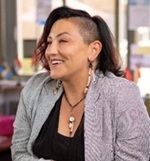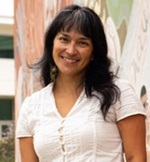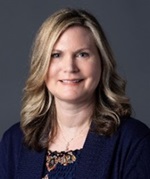March 27, 2024
Contact: Melissa Villarin
Office: 916-327-5365
Office E-mail: MVillarin@CCCCO.edu
SACRAMENTO, Calif. — An Ethnic Studies professor at Sierra College, an English professor from Santa Barbara College, a history instructor from Mt. San Jacinto College and an ESL instructor from MiraCosta College are the 2023-24 winners of the California Community Colleges Hayward Award for Excellence in Education.
This year’s awardees were honored at the March 25th Board of Governors meeting in Sacramento.
The Hayward Award for Excellence in Education program, established in 1989 and named in honor of former California Community College Chancellor Gerald C. Hayward, are presented annually to celebrate outstanding community college faculty members for their commitment to their students, college and profession.
“We are extremely proud of this year’s Hayward Award winners. Each recipient is dedicated to students - using their unique background and life experience to shape their approach to education. The careful work of each award winner has significantly advanced our Vision 2030 goals of equity in access, equity in support and equity in success. The Hayward winners are an inspiration to us all,” said California Community Colleges Chancellor Sonya Christian.
Award recipients are nominated by their college academic senate and selected by representatives of the Academic Senate for California Community Colleges.
“Congratulations to this year's Hayward Award winners and to all faculty nominated for the award by their college academic senates. The four honorees are incredible examples of dedicated student-centered educators who lead in the classroom and within their profession, who honor the diversity and lived experiences of their students in their teaching, and who are committed to serving their students, colleagues, colleges and communities,” said Academic Senate for California Community Colleges President Cheryl Aschenbach.
This year’s honorees are:
 Melissa Leal is a full-time Ethnic Studies professor at Sierra College who is Esselen, is driven by an experience as an undergraduate when her professor said the Esselen people and language no longer exist. “I knew from that day forward that my goal and duty as an instructor (whether it be in K-12 or higher education) was to ensure that no student ever felt invisible like I did that semester. My commitment to serving and empowering students from diverse backgrounds and experiences comes from that moment.”
Melissa Leal is a full-time Ethnic Studies professor at Sierra College who is Esselen, is driven by an experience as an undergraduate when her professor said the Esselen people and language no longer exist. “I knew from that day forward that my goal and duty as an instructor (whether it be in K-12 or higher education) was to ensure that no student ever felt invisible like I did that semester. My commitment to serving and empowering students from diverse backgrounds and experiences comes from that moment.”
 Melissa Menendez is a full-time English professor at Santa Barbara City College. “As a descendant of migrant farm laborers who decided to pursue a PhD in English, I became acutely aware that many institutions are not designed to include the working poor, undocumented or those whose English is accented. The experiences of my immediate family and my own explain why I advocate for changes in institutional policies and curriculum to manifest higher education as a space of liberation for all.”
Melissa Menendez is a full-time English professor at Santa Barbara City College. “As a descendant of migrant farm laborers who decided to pursue a PhD in English, I became acutely aware that many institutions are not designed to include the working poor, undocumented or those whose English is accented. The experiences of my immediate family and my own explain why I advocate for changes in institutional policies and curriculum to manifest higher education as a space of liberation for all.”
 Sandra Blackman is a part-time History faculty member at Mt. San Jacinto College whose students come from historically marginalized communities. Blackman is an advocate of employing zero cost textbooks as well as a plethora of free and low-cost online sources. She also incorporates the diverse backgrounds of her students – such as age, race, ethnicity and country of origin – into the history they are studying while honoring the validity of their own personal experiences.
Sandra Blackman is a part-time History faculty member at Mt. San Jacinto College whose students come from historically marginalized communities. Blackman is an advocate of employing zero cost textbooks as well as a plethora of free and low-cost online sources. She also incorporates the diverse backgrounds of her students – such as age, race, ethnicity and country of origin – into the history they are studying while honoring the validity of their own personal experiences.
 Katrina Tamura is a part-time noncredit ESL faculty member at MiraCosta College. “With 18 years devoted to teaching in California Community Colleges' adult ESL programs, I serve an exceptionally diverse student body. These students, with varying levels of preparedness, cultural backgrounds, religions, first languages, ages, socioeconomics, abilities and more, inspire my commitment to fostering inclusivity and accessibility.” Tamura, who also teaches at Palomar College, once taught English as a foreign language at a university in China and has designed online courses for her department.
Katrina Tamura is a part-time noncredit ESL faculty member at MiraCosta College. “With 18 years devoted to teaching in California Community Colleges' adult ESL programs, I serve an exceptionally diverse student body. These students, with varying levels of preparedness, cultural backgrounds, religions, first languages, ages, socioeconomics, abilities and more, inspire my commitment to fostering inclusivity and accessibility.” Tamura, who also teaches at Palomar College, once taught English as a foreign language at a university in China and has designed online courses for her department.
The Hayward Awards are supported through a grant from the Foundation for California Community Colleges. Each recipient receives $1,250 and a commemorative plaque.
To view pictures of the Hayward Awards presentation, please visit our Hayward Awards photo collection.
The California Community Colleges is the largest system of higher education in the nation, composed of 73 districts and 116 colleges serving 1.9 million students per year. California community colleges provide career education and workforce training; guaranteed transfer to four-year universities; and degree and certificate pathways. As the state’s engine for social and economic mobility, the California Community Colleges supports the Vision 2030, a strategic plan designed to improve student success, our communities and our planet. For more information, please visit the California Community Colleges website or follow us on Facebook, Instagram and Twitter.
###

